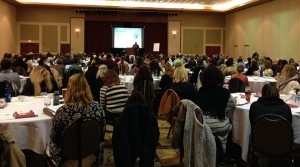On Tuesday, February 23rd, eight MSW IV-E Fellows attended the University of Minnesota – Duluth School of Social Work’s Winter Institute in Hinckley, Minnesota. This year’s topic was Addressing American Indian Child Welfare Policy and Practice in Minnesota. Over 260 child welfare practitioners from around the state of Minnesota, representing 19 counties, 7 tribal agencies, over 30 non-profit child and family service agencies, 4 GAL districts, MN Department of Human Services, and 8 colleges and universities attended this full day conference. Participants were able to listen to relevant policy and practice formal presentations as well as connect and have practice conversations between sessions.
Below are some thoughts from MSW IV-E Fellows who attended this year:
“Larry Jourdain’s in-depth description about the dynamics of the Lynx clan family dynamics was eye opening and immensely helpful to those of us beginning our careers in the field of child welfare.”
“Overall the morning presentation was wonderful. It was great that the presenter explained the history of clans and how different families within clans work. I think what we all took away (at our table at least) was that different families have different genograms and different roles in regards to children in families. For example, the speaker mentioned that he held the role of the disciplinarian for his nephew, although his nephew did not live in his home. This is something we need to keep in mind going forward as we work in child welfare with families, and it emphasizes the importance of allowing families to share how their family system works and the various roles family members take on in relation to children.”
“At the end of the institute an elder succinctly explained that ‘band is to tribe as state is to country’. This really aided my understanding of the Native structure. Another portion of the conference that really struck me was when the morning speaker spoke to the broader family structure and roles, which aided me in reflecting back on the primarily Eurocentric approach we take. By not making assumptions and exploring a family’s structure and roles we can better serve our families and children.”
“I was absolutely enthralled during Lawrence’s presentation. The stories that he incorporated into his discussion allowed me to consider aspects of child welfare practice in a different way. His presentation of the family genogram was very enlightening for me. An assumption that is often made in child welfare practice is that the parents are the ones in charge of discipline and teaching. However, as Lawrence presented, in many Anishinaabe families it is actually the aunts and uncles who have these responsibilities so that the parents can have a loving relationship with the child that is not clouded by these other responsibilities. Having an understanding of this family structure could greatly affect how a child welfare worker approaches and understands a family.”
“I’m thankful for the opportunity to learn more about ICWA and working with Native American children and families. I especially appreciated hearing the perspectives of other practitioners. The speakers challenged participants, and I feel like I was able to grow my understanding of best practices with Native American families.”
“One of the biggest things that I appreciated about the Winter Institute was the presentation and Q and A time about the most recent changes to ICWA and what is best practice regarding this legislation. Many thanks to the presenters and coordinators of this institute for all of their hard work.”
To learn more about UMD’s Winter Institute and the Center for Regional and Tribal Child Welfare Studies, please visit: https://cehsp.d.umn.edu/departments-centers/department-social-work/center
